Home > Blog > Covid-19
With Time to Kill, They Learned New Skills
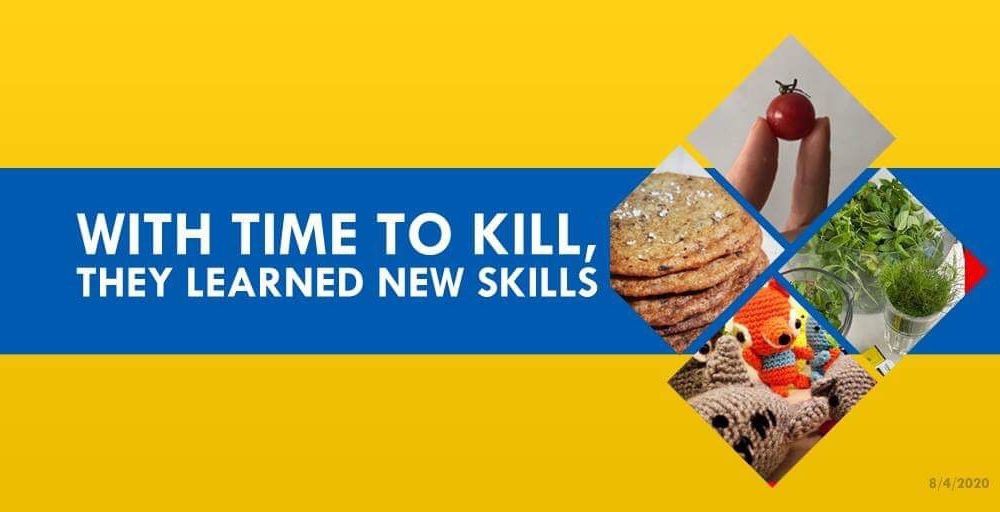
Upon the urgent plea of exhausted health workers due to the rise of COVID-19 cases in the country, the government has reverted Metro Manila as well as Bulacan, Cavite, Laguna and Rizal to Modified Enhanced Community Quarantine (MECQ) from August 4 to August 18. With the halt of public transport in these areas and the high risk of viral transmission, working from home—for some—is not just an option but a necessity.
According to a global study conducted by Lenovo this year, seven out of ten employees have personally invested in tech equipment that allows them to work from home, and that 63% feel they are more productive now than they were in the office. More than 70% think that even after social distancing measures are lifted, their work-from-home status will be extended—an arrangement that was encouraged long before COVID-19 to address Metro Manila’s perpetual traffic.
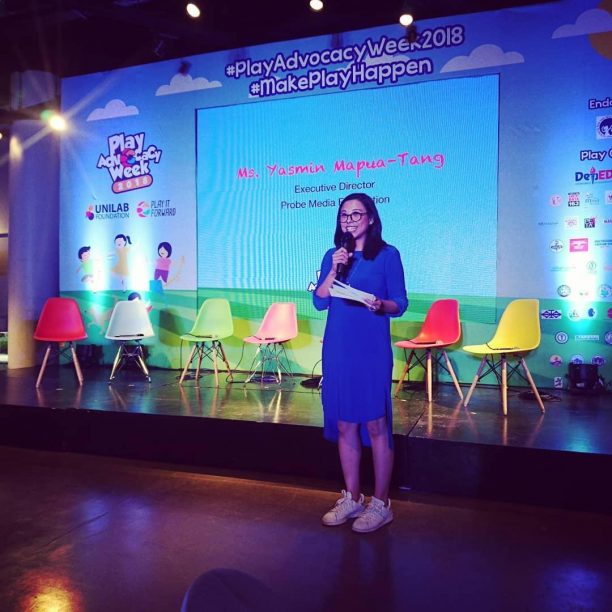 Yas in a panel discussion (photo by Dante Gagelonia)
Yas in a panel discussion (photo by Dante Gagelonia)
But for Yas Mapua-Tang, Executive Director of Probe Media Foundation, the shift from her pre-pandemic schedule was a huge adjustment. “Before the pandemic, I would go to the office, attend work meetings, conduct training workshops, and travel out of town at least once a month. I would sit in traffic for hours—which I would use to work, read or do crafts.”
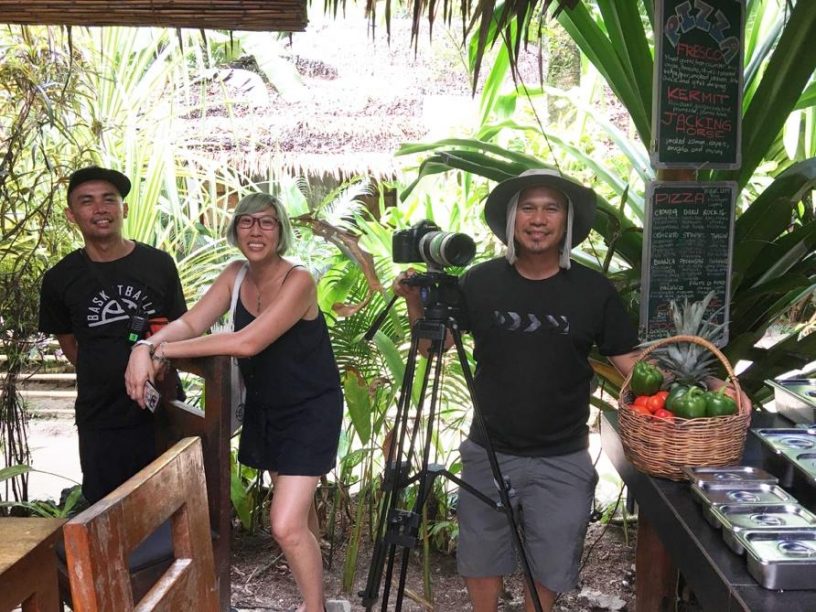 Jona (center) during a shoot
Jona (center) during a shoot
Jona Cham-Lago who works in video production is used to a packed routine. “Our family’s normal weekday routine before the pandemic consisted of waking up at around 5 a.m. My husband and I would bring our kids either to their grandmother or school before we go to work. I go out on shoots usually within Metro Manila and occasionally out of town for a few days.”
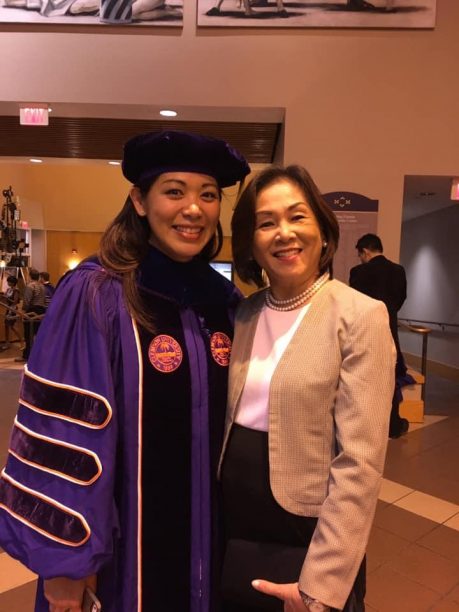 Data (left) earning her doctoral degree in the Rhetorics, Communication and Information Design (RCID) program at Clemson University in South Carolina, USA
Data (left) earning her doctoral degree in the Rhetorics, Communication and Information Design (RCID) program at Clemson University in South Carolina, USA
As a faculty member of the Department of Broadcast Communication in the University of Philippines (UP) in Diliman, Data Tolentino-Canlas was always on her toes. “I’d get up at 6 am for my therapy (for an injured knee) and rush to UP for my class after lunch. My classes would end either at 4 p.m. or 7 p.m. I go home, prepare dinner and work, finishing up at around 11 p.m.”
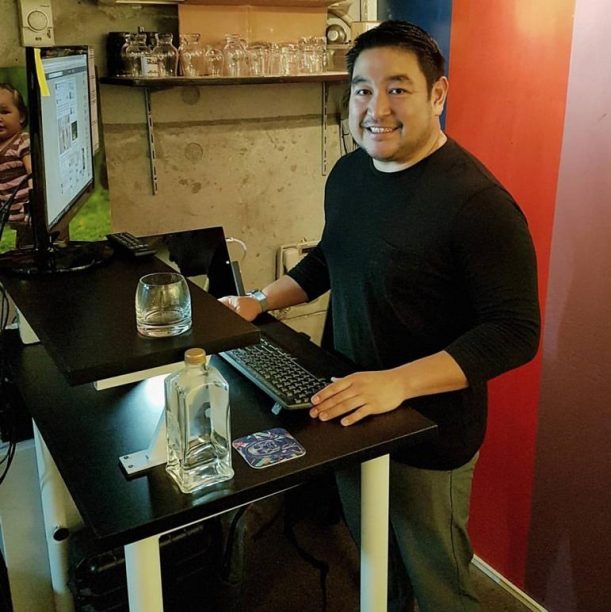 Adrian in his workstation
Adrian in his workstation
Adrian Tecson, who runs four advertising-related companies, including a video production company and a creative consultancy group, is used to going to the office every day, overseeing shoots and attending meetings. “I enjoyed being on the go and doing a lot of things,” he shares.
When the pandemic came, these dynamic individuals were forced to stay put. As they worked from home, they discovered having something in abundance, something which they felt they used to chase—time.
Passion Projects
 Yas crocheting a colorful blanket
Yas crocheting a colorful blanket
With time on her hands, Yas decided to pursue a childhood hobby—crocheting. “My grandmother was an avid crafter and she loved to crochet. I recall sitting on her lap, her arms around mine, holding my hands and showing me how to hold a hook and do a chain stitch. She taught me to make doilies, dresses for my dolls, and other things to play with. As I grew up, I would crochet less. In my adult years, from college to marriage and being a mom, I hardly picked up a hook.”
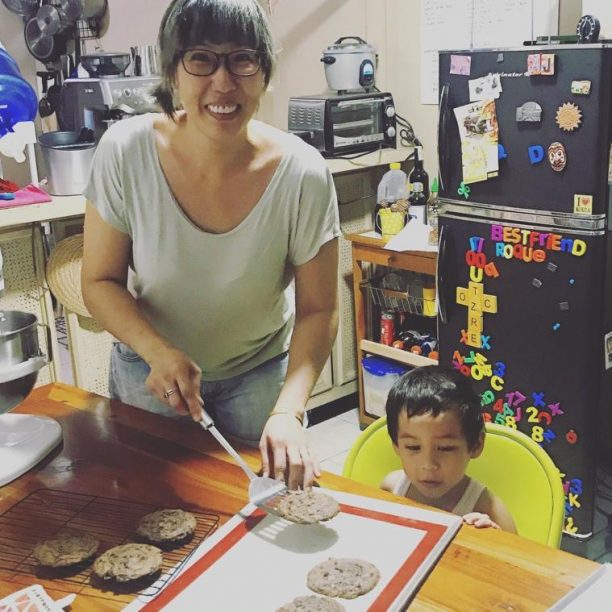 Jona baking her favorite chocolate chip cookies
Jona baking her favorite chocolate chip cookies
For Jona, who disliked cooking, baking was a hobby that consisted of following one recipe for chocolate chip cookies. But all that changed when the pandemic came. “I don’t know if it’s the extra time or the anxiety, but I got a little obsessed with chocolate chip cookies during the lockdown, which led to me trying different cookie recipes.” She proudly adds, “In the last four months, I’ve baked several versions of chocolate chip cookies, chocolate banana bread, revel bars, a chocolate cake with ganache frosting from scratch, chocolate crinkles and different kinds of muffins. I even tried making my own strawberry jam, which turned out really, really good!”
 Data in her flourishing container garden
Data in her flourishing container garden
As early as last year, Data and her husband have been filling their garage with succulents. But due to negligence, the plants died. “This time, we tried to do container gardening. From our kitchen scraps, we grew vegetables. Then we started getting cuttings from friends, or gathering them from vacant lots. Before we knew it, we had turmeric, kangkong, calamansi, bell peppers, sili and kamote.”
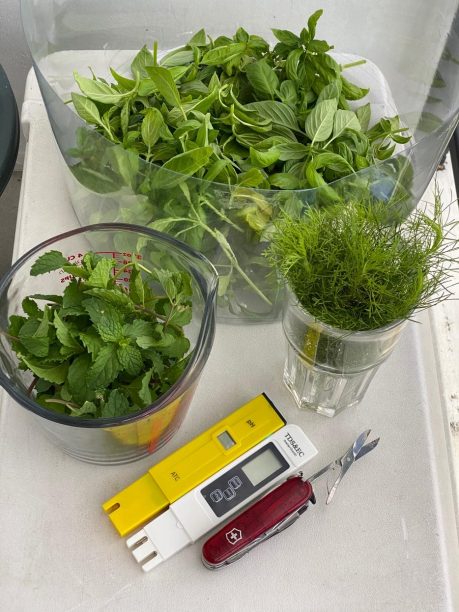 Adrian’s harvest of basil and dill, and his tools for hydroponics
Adrian’s harvest of basil and dill, and his tools for hydroponics
Hydroponics has always appealed to Adrian’s techie side, which was why he started it in his balcony during quarantine. “I watched a YouTube video, which got me buying my first hydroponics kit. It’s like a styrofoam box with holes and styro cups at the top where you put the seedlings. I started with some dill and basil then I joined a Facebook group, where I learned to make hydroponic pots from tubes and soft drink bottles. I bought shelves and other stuff like PH meters and nutrient solutions to propagate my plants.”
Such displays of productivity speak of resiliency according to psychologist Roselle G. Teodosio, owner of IntegraVita Wellness Center. “People who have picked up new skills or went back to their old hobbies are better off, mentally speaking,” she says. “A new activity or hobby has an effect on a person’s self-confidence, self-esteem and overall wellness. Being productive boosts these traits, lowering stress levels. This would also distract them from the pandemic.”
Finding fulfillment
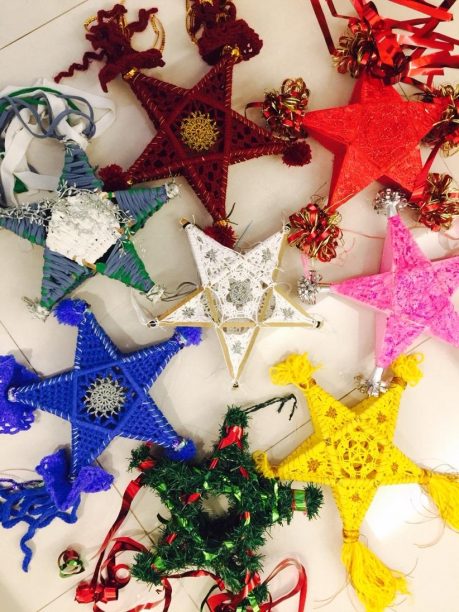 Crocheted Christmas lanterns
Crocheted Christmas lanterns
 Yas crocheted a baby blanket for her nephew.
Yas crocheted a baby blanket for her nephew.
Yas reveals that crocheting helped her deal with the death of her grandmother years ago. “Holding the hook and yarn in my hand and going through the stitches made me recall the love, comfort, and safety I felt while sitting on her lap. To this day, I still picture my grandmother when I crochet and I try to infuse the same love and happiness in all my projects.” Her passion projects also helped manage her emotions during the pandemic. “Like many others I was anxious, afraid, and distraught. In the first few months of COVID-19, I didn’t pick up a hook at all. But I eventually came to terms with the uncertainties of the situation. I looked at my colorful yarn stash and I began to make a simple granny square. Then, the granny square got bigger. Eventually I had enough to make a whole blanket. I think there is more positive energy at home, which allows me to create more, including a baby blanket for my sister-in-law who just gave birth.
 Jona’s chocolate ganache cake
Jona’s chocolate ganache cake
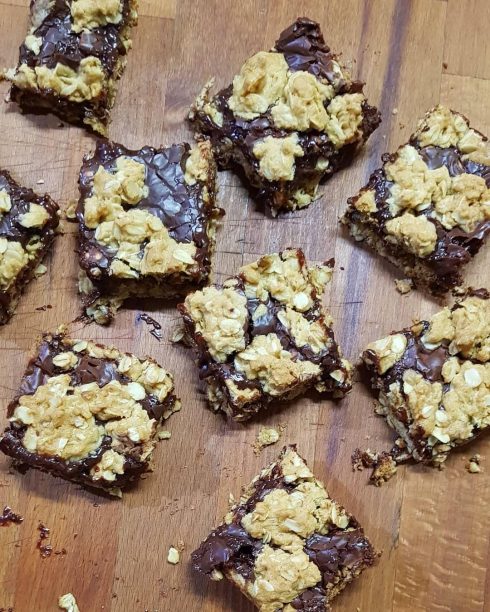 Homemade revel bars
Homemade revel bars
For Jona, the process of following a recipe and measuring out ingredients calmed her. “When I am baking, I am fully immersed in what I am doing. There is something reassuring about knowing that I will get a cookie or a muffin or a cake at the end of the required baking period.” This semblance of control has helped keep her anxiety in check. “I can at least control what goes in my mixing bowl and what comes out of my oven. The fact that I see the results so quickly also makes that part of me that craves instant gratification very happy.”
 Data tending to her garden
Data tending to her garden
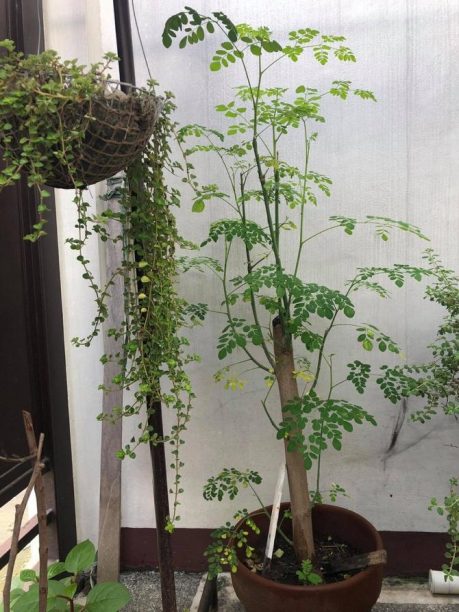 Thriving malunggay
Thriving malunggay
Data finds tending to her small garden therapeutic. “It’s nice to see something grow. It becomes a metaphor for you, that despite the conditions you’re in, you grow—or try to grow. Another obvious benefit is we have something to eat. I can eat as much greens as I want thanks to my garden.” To get a full view of her garden, Data has positioned her desk near the window. “It’s an encouraging view. When I’m tired, I go outside and stand among my plants. I cut some stems and talk to my plants.”
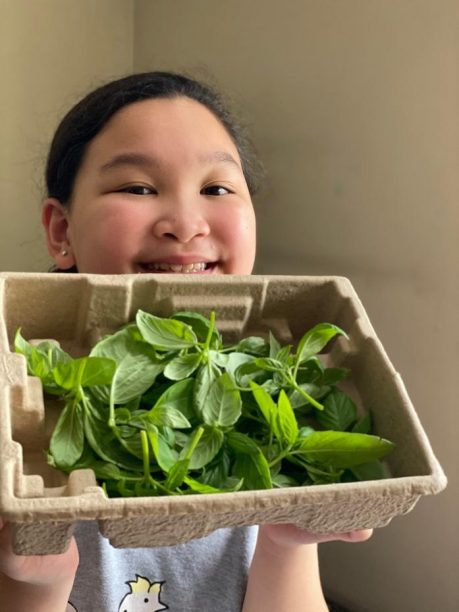 Adrian’s daughter is also into hydroponics.
Adrian’s daughter is also into hydroponics.
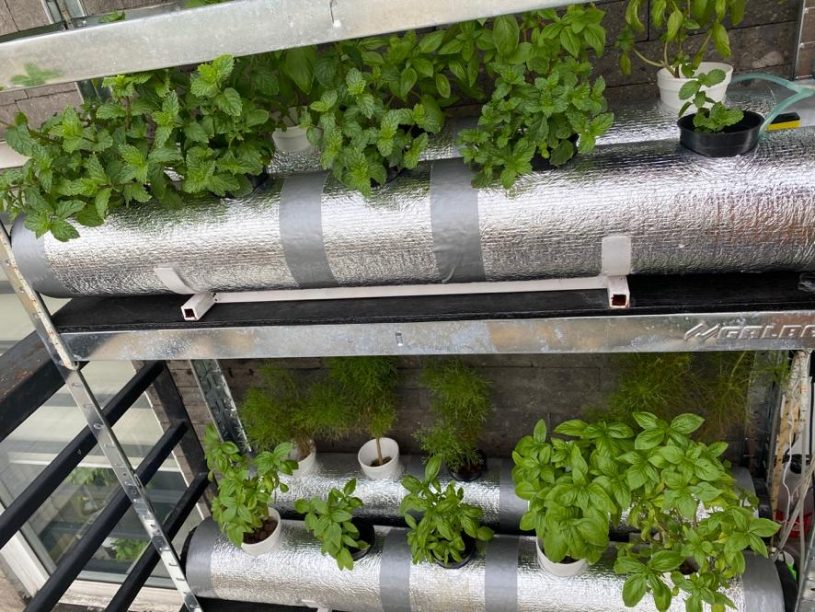 Adrian’s DIY setup
Adrian’s DIY setup
Adrian enjoys the same benefits from his hydroponic garden. “At this time of uncertainty when you don’t see progress, you look at your plants and there’s growth. There’s hope. It has really changed my perspective a lot. I don’t need to leave the house all the time and I get to spend time with the kids. This is a coping mechanism that lets me focus more on myself and my family. This is something you can control to a certain extent but you also need faith. You also need to trust God and nature.”
The pressure to be productive
Though productivity is a laudable trait during the pandemic, Teodosio clarifies that a person’s level of productivity depends on several factors. “One is his economic security. If a person is still able to work, then his productivity level may not be as affected compared to someone with no job security. Second is physical health. People who regularly exercise tend to be more productive. The more physically active a person is, the more he is able to handle stress. Third is mental health. A person who has a history of anxiety or depression is more likely to have a relapse. In this case, when people are asked to distance themselves from others, the tendency is to feel isolated and disconnected. Even people who have never experienced mental conditions may feel these two most common problems, and may feel confused and scared.”
Because the pandemic is unforeseen, Teodosio believes that making space for grief and being unproductive is valid, even necessary. “There is an added pressure, most especially from social media, to make the most out of the situation, kind of like making lemonade out of lemons. This can make people more frustrated with themselves, when they can’t seem to find their own “niche.” Also, people are afraid to show their fear, lest they be labeled as negative or a pessimist. But it is actually okay to feel not okay, to admit that one feels fear, that one is afraid, that one cannot function well since there is really an uncertainty during this time. It is also very natural to grieve. Grief would mean an end to something, not just death of a person. It is an end to a friendship, an end to a relationship, an end to a dream and most of all, an end to a lifestyle, a life one had known.”
Yas admits that she seesaws between productivity and lack of activity. “I believe that we need to listen to ourselves and acknowledge our emotions, then act in a way that is appropriate, whether it is doing nothing or doing something.” Jona agrees. “I’ve learned to give myself time to be sad. I don’t force myself to ‘be positive’ or ‘look on the bright side’ when I get overwhelmed. Instead I try to embrace the helplessness and the sadness and let it run its course.”
In the meantime, Data sees gardening as her reward. “Even if I have deadlines, I tend to my plants. Someone told me that it’s good to reward yourself even if you haven’t been productive.”
Teodioso says it’s important to feel the emotions, to slow down and be unproductive. “There is nothing wrong with being positive or creative or even productive. But sometimes, we have to give ourselves space to feel bad. This is a normal reaction to what’s happening in the world. This might be the way for them to accept the reality and in that acceptance, embrace it and adapt to it.”
Prolonged unproductiveness
But what happens when the unproductive period becomes prolonged? Teodosio states that this may lead to feelings of failure, anxiety, anger, loneliness, emptiness and other negative emotions. “These are signs of anxiety and depression. It is not healthy anymore when this unproductiveness lead to the inability to function.”
To deal with this situation, Teodosio recommends the following steps:
- Admit that you are in a state of anxiety and depression. Being aware of one’s mental state is the first step toward healing.
- List down the things you enjoyed doing in the past. Teodosio recommends listing these items in order of priority and making an effort to do them.
- Make a grateful list every day. This allows a shift in perspective, and an appreciation for the “small” things, which are often overlooked.
- Find someone else to help. This contributes to a person’s sense of purpose. Teodosio says that “being appreciated and valued has a positive effect on a person’s outlook in life.”
- Change your daily routine. Inject an activity that you’ve been neglecting such as exercise, reading, or even daydreaming.
- Radically accept your reality. Accept that there are things that are beyond your control and this pandemic is one of them. Instead, focus on things you can control, like your way of thinking, reaction to things and feelings.
- Reach out for help. “When one is starting to feel negative emotions to the point that he wants to harm himself, he has to reach out for professional help,” Teodosio says. “Admitting that you need help is a step closer to helping yourself get out of a rut.”
If you’re one of those feeling anxious or depressed, don’t hesitate to reach out to the following:
- Roselle Teodosio (psychologist) – 09166961223 and 09088761223 or email: selteodosio@gmail.com
- National Center for Mental Health Crisis – 09178998727
- Philippine Mental Health Association – 09175652036
- Philippine Psychiatric Association – 09189424864

